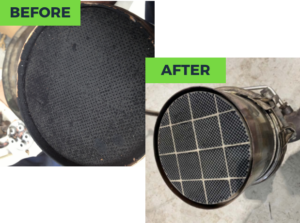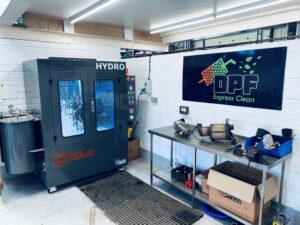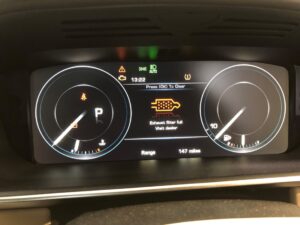Mobile DPF clean versus garage DPF clean: which is better?
DPF cleaning is important to maintain the health and performance of your diesel vehicle. But with a range of DPF services to choose from, how do you know what type of clean is right for you?
Not only do you have the choice of a mobile DPF clean or an in-garage alternative, but you also need to decide whether you want to go with chemicals or hydrodynamic technology.
In our guide, we’ll explain DPF cleans, define why they’re essential for long-term vehicle maintenance, and run you through every DPF cleaning option.
What is a DPF clean?
A diesel particulate filter (DPF) clean in the process of removing soot and other carbon deposits from your DPF to prevent blockages. Not only does it protect the longevity of your vehicle, but it can also help to improve engine performance and fuel consumption.
How often should you get a DPF clean?
You should get your DPF cleaned every 75,000 miles or annually, though this can vary depending on the type of vehicle and your overall driving style.
If you typically use your diesel vehicle for short trips such as school runs or nipping to the shops, you’re more likely to need a DPF clean sooner because your vehicle has less time to self-regenerate.
Alternatively, if you regularly use your vehicle for long commutes, your engine is more able to sustain optimum temperatures that trigger the self-cleaning process of your DPF.

Chemical DPF clean versus hydrodynamic DPF clean
Whether you want to clean your own DPF, use a mobile service, or book in at your local garage, most options use chemicals as part of the cleaning process.
Not only is this bad for the environment, but it can also corrode the core of your DPF and fail to reach the depths of every DPF chamber meaning you need to fork out for more cleans, more regularly.
With a hydrodynamic DPF clean, the process combines turbulent water flow with compressed air to remove up to 98% of deposits with every flush. Once the DPF is removed from your vehicle, the cleaning process takes around 50 minutes to complete.
By opting for a hydrodynamic clean, you’re also playing a small part to protect the planet from harmful chemicals. And because the process doesn’t use additives, you’re also preventing the risk of DPF chemical corrosion.

Mobile DPF clean versus garage DPF clean
Although a mobile DPF clean might be more convenient, the service typically involves a chemical clean which doesn’t reach the standards of a hydrodynamic alternative.
To get your money’s worth, it’s smarter to leave your diesel vehicle at an approved DPF cleaning centre who can unclog your DPF using environmentally-friendly processes that achieve better results.
Not only will it save you money in the long run, but it also means you’re more likely to benefit from restored engine performance and improved fuel economy.
If you live within a five-mile radius of our garage in Peacehaven, we can arrange collection and delivery of your vehicle to save you time and hassle. Simply get in touch and we’ll sort out the rest.
How to tell when you need a DPF clean
In most cases, an amber light in the shape of an exhaust pipe will illuminate on your dashboard when the DPF is blocked or failing. It’s important you treat the warning light as a priority by booking in your DPF clean sooner rather than later.

If you ignore the warning, your DPF may reach a point where it’s beyond restoration meaning you’ll need to get a replacement which potentially costs thousands of pounds.
How much does a DPF clean cost?
Depending on the vehicle make, age, and model, a chemical or hydrodynamic DPF clean ranges between £150 to £300. Further labour fees may apply to remove and reinstall your DPF once the cleaning process is complete. At C R Allen and Sons, our DPF hydrodynamic cleaning service starts at £200 + VAT.
Book your DPF clean
To learn more about our hydrodynamic DPF cleaning technology or to book a clean, call 01273 584 987.